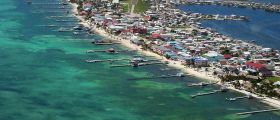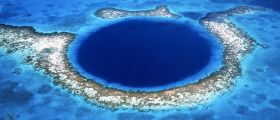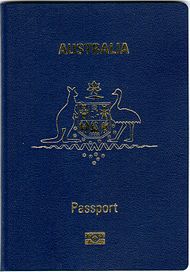Do I need a second passport if I retire, work, or live abroad?
RICH Novak - RE/MAX Beaches & City! INC.
With regard to Panama - here's how things are working as of December 28, 2012. You do NOT repeat NOT need a second passport to retire or work in Panama.
Panama is a great place for you to retire. Many experts say that Panama's Pensionado (Retirement) Program is the very best. I am a Panama Pensionado. You need a Panama lawyer to help you with becoming a Pensionado. The Panama law firm that I recommend is Panama Relocation Attorneys is Panama City.
...
Panama is a great place for you to retire. Many experts say that Panama's Pensionado (Retirement) Program is the very best. I am a Panama Pensionado. You need a Panama lawyer to help you with becoming a Pensionado. The Panama law firm that I recommend is Panama Relocation Attorneys is Panama City.
...
With regard to Panama - here's how things are working as of December 28, 2012. You do NOT repeat NOT need a second passport to retire or work in Panama.
Panama is a great place for you to retire. Many experts say that Panama's Pensionado (Retirement) Program is the very best. I am a Panama Pensionado. You need a Panama lawyer to help you with becoming a Pensionado. The Panama law firm that I recommend is Panama Relocation Attorneys is Panama City.
At this time, a Pensionado can NOT legally work (have income), but a Pensionado can - however - own a Panama Corporation & the Panama Corp can have income. Be very careful here because certain types of business can only be owned by Panamanian citizens. You need to be represented by a competent Panama lawyer.
Being able to legally work in Panama is much more complicated. Panama protects its citizens and makes it very difficult for foreigners to obtain a Panama work permit. However, recently President Martinelli issued Executive Order 343 & this Executive Order may make it easier for foreigners to obtain work permits... but because all this info is so brand new - the mechanics of this Program are still being sorted out by Panama's Immigration Department.
The economy & tourism industry are absolutely booming here in Panama & recently I read that 10,000 additional workers are needed because of all the new Panama hotels that are currently under construction.
Maybe I should also mention that when a citizen of North America comes to Panama as a tourist, this person may remain in Panama for up to 180 days... before the 180 days are over a tourist then needs to leave Panama for 72 hours, but after the 72 hours the tourist can return to Panama for another 180 days. And you can do this over & over & over again & again I personally know of people who have in effect been Perpetual Tourists (PTs) in this manner. In fact my wife & I were PTs before we became Panama Pensionados. A tourist and/or PT can NOT legally work (have income) here in Panama, but even a foreign tourist can own a Panama Corporation & the Panama Corp may have income.
Come To Panama & Turn YOUR Frown Upside Down!
Panama is a great place for you to retire. Many experts say that Panama's Pensionado (Retirement) Program is the very best. I am a Panama Pensionado. You need a Panama lawyer to help you with becoming a Pensionado. The Panama law firm that I recommend is Panama Relocation Attorneys is Panama City.
At this time, a Pensionado can NOT legally work (have income), but a Pensionado can - however - own a Panama Corporation & the Panama Corp can have income. Be very careful here because certain types of business can only be owned by Panamanian citizens. You need to be represented by a competent Panama lawyer.
Being able to legally work in Panama is much more complicated. Panama protects its citizens and makes it very difficult for foreigners to obtain a Panama work permit. However, recently President Martinelli issued Executive Order 343 & this Executive Order may make it easier for foreigners to obtain work permits... but because all this info is so brand new - the mechanics of this Program are still being sorted out by Panama's Immigration Department.
The economy & tourism industry are absolutely booming here in Panama & recently I read that 10,000 additional workers are needed because of all the new Panama hotels that are currently under construction.
Maybe I should also mention that when a citizen of North America comes to Panama as a tourist, this person may remain in Panama for up to 180 days... before the 180 days are over a tourist then needs to leave Panama for 72 hours, but after the 72 hours the tourist can return to Panama for another 180 days. And you can do this over & over & over again & again I personally know of people who have in effect been Perpetual Tourists (PTs) in this manner. In fact my wife & I were PTs before we became Panama Pensionados. A tourist and/or PT can NOT legally work (have income) here in Panama, but even a foreign tourist can own a Panama Corporation & the Panama Corp may have income.
Come To Panama & Turn YOUR Frown Upside Down!
Posted December 28, 2012
Jay Butler - Asset Protection Services of America
 We know of no country which requires a person to obtain a second passport to retire or work abroad.
We know of no country which requires a person to obtain a second passport to retire or work abroad. However it would be prudent to point out that retiring abroad (meaning the ability to reside in another country) does not in-and-of-itself grant you the right to work in that country should you so wish to do so. Although working abroad may somewhat contradict the point of retiring abroad, you may get a little bored over time or find the need to...
 We know of no country which requires a person to obtain a second passport to retire or work abroad.
We know of no country which requires a person to obtain a second passport to retire or work abroad. However it would be prudent to point out that retiring abroad (meaning the ability to reside in another country) does not in-and-of-itself grant you the right to work in that country should you so wish to do so. Although working abroad may somewhat contradict the point of retiring abroad, you may get a little bored over time or find the need to create additional income should your retirement budget prove insufficient in satisfying your desired lifestyle.
For example, Belize offers a "Qualified Retired Persons Program" which, upon approval of meeting their annual $24,000 per year retirement income qualification, allows foreigners to reside (retire) in their country. The same program also offers an optional "work visa" for applicants willing to pay the additional application fees. So, this is an illustration of how a second passport is not required to retire or work abroad and furthers the answer by distinguishing the ability to retire and the ability to work in a foreign country.

So, although the immediate answer to this question is direct and straight forward, I would caution readers to be aware of the difference between a residency or retirement permit and a work visa. Be sure to seek legal advice with regards to the laws of the country wherein you have an interest to retire or work abroad.
Additionally, if you choose to live in a country which currently offers any dual-citizenship programs by means of naturalization or investment, you should be conscious of the laws in your home country too. Some retirement benefits may require you to maintain residency in your home jurisdiction and certain government pensions forbid residing outside the country for extensive periods of time - usually determined to be in excess of 180 days.

Lastly, although you do not need a second passport to reside or work abroad, you still need to ensure your current passport is valid in your home country whenever traveling, retiring or working abroad. Many countries will not even grant entry into their country if your current passport has less than 6 months time remaining to expiration. Whenever possible, it is a good idea to renew your passport as soon as you have entered the last 12 months of its validity. If you are retiring or working abroad you will, at the very least, need to have one current passport issued from your home country.
Posted April 1, 2013
Allen Rosen - Chiriqui Coastal Real Estate
Different countries have different rules about needing a second passport to retire or work abroad. In Panama you do not need a second passport to work or retire. You will, however, need a permanent resident visa to live here long term. You can also get a work permit if you have skills that are in short supply here -- eg. engineering or computer programming..
Different countries have different rules about needing a second passport to retire or work abroad. In Panama you do not need a second passport to work or retire. You will, however, need a permanent resident visa to live here long term. You can also get a work permit if you have skills that are in short supply here -- eg. engineering or computer programming..
Posted April 3, 2013
Karyn Saunders
No you do not need a second passport to retire, work, or live abroad. You can reside in Panama as a tourist but it is recommended to apply for one of the many visas offered. There are plenty to choose from for the retired and non-retired. Panama has opened its doors to many nations due to the need for skilled labour. The new Friendly Nations visa has made it a lot easier for individuals who are not ready to retire but who want to live and work in Panama.
No you do not need a second passport to retire, work, or live abroad. You can reside in Panama as a tourist but it is recommended to apply for one of the many visas offered. There are plenty to choose from for the retired and non-retired. Panama has opened its doors to many nations due to the need for skilled labour. The new Friendly Nations visa has made it a lot easier for individuals who are not ready to retire but who want to live and work in Panama.
Posted August 11, 2013
Roy Cannon - Gestoria Cocle - main office in Penoneme
Short answer: NO
Panama does offer a passport to people who comply with a series of regulations. One is available almost immediately with an investment of $300,000 - which can be in property if desired. Generally people who have an indefinite visa that is non-Pensionado, and who have lived in Panama for five years, can apply for citizenship....which does not automatically revoke your US citizenship. There are a number of options that...
Short answer: NO
Panama does offer a passport to people who comply with a series of regulations. One is available almost immediately with an investment of $300,000 - which can be in property if desired. Generally people who have an indefinite visa that is non-Pensionado, and who have lived in Panama for five years, can apply for citizenship....which does not automatically revoke your US citizenship. There are a number of options that will lead to Panamanian nationality. You will need a lawyer who is experienced in this area to advise you.
There are advantages to having a second passport, for banking and travel purposes. (Don't get stuck in the Moscow airport without one.).
Take professional advice.
Posted October 8, 2013
Mike Cobb - ECI Development
You do not need a 2nd passport to live abroad.  You don’t even need a 2nd residency to live overseas, but it certainly makes life easier and more convenient. Many people for the first year stay in country on a tourist visa and either leave the country periodically or go to immigration to have the tourist visa renewed periodically. Obtaining a permanent residency takes time and some hassle, but is worth it in the end if you decide to stay in your new home country.
You don’t even need a 2nd residency to live overseas, but it certainly makes life easier and more convenient. Many people for the first year stay in country on a tourist visa and either leave the country periodically or go to immigration to have the tourist visa renewed periodically. Obtaining a permanent residency takes time and some hassle, but is worth it in the end if you decide to stay in your new home country.
 You don’t even need a 2nd residency to live overseas, but it certainly makes life easier and more convenient. Many people for the first year stay in country on a tourist visa and either leave the country periodically or go to immigration to have the tourist visa renewed periodically. Obtaining a permanent residency takes time and some hassle, but is worth it in the end if you decide to stay in your new home country.
You don’t even need a 2nd residency to live overseas, but it certainly makes life easier and more convenient. Many people for the first year stay in country on a tourist visa and either leave the country periodically or go to immigration to have the tourist visa renewed periodically. Obtaining a permanent residency takes time and some hassle, but is worth it in the end if you decide to stay in your new home country. You do not need a 2nd passport to live abroad.  You don’t even need a 2nd residency to live overseas, but it certainly makes life easier and more convenient. Many people for the first year stay in country on a tourist visa and either leave the country periodically or go to immigration to have the tourist visa renewed periodically. Obtaining a permanent residency takes time and some hassle, but is worth it in the end if you decide to stay in your new home country.
You don’t even need a 2nd residency to live overseas, but it certainly makes life easier and more convenient. Many people for the first year stay in country on a tourist visa and either leave the country periodically or go to immigration to have the tourist visa renewed periodically. Obtaining a permanent residency takes time and some hassle, but is worth it in the end if you decide to stay in your new home country.
 You don’t even need a 2nd residency to live overseas, but it certainly makes life easier and more convenient. Many people for the first year stay in country on a tourist visa and either leave the country periodically or go to immigration to have the tourist visa renewed periodically. Obtaining a permanent residency takes time and some hassle, but is worth it in the end if you decide to stay in your new home country.
You don’t even need a 2nd residency to live overseas, but it certainly makes life easier and more convenient. Many people for the first year stay in country on a tourist visa and either leave the country periodically or go to immigration to have the tourist visa renewed periodically. Obtaining a permanent residency takes time and some hassle, but is worth it in the end if you decide to stay in your new home country. Posted December 30, 2013
Gabriela Estrada
You do not need a second passport if you retire and choose to work or live abroad. It is, though, highly recommended to get a residency, which, for example, in Nicaragua is a very easy thing to do. All you would need to do is pay $2 for the application, fill it out, get a couple of medical tests and then you are all set.
With this residency you wouldn't have to worry about migration problems, you will be able to come and go from the country and you are...
You do not need a second passport if you retire and choose to work or live abroad. It is, though, highly recommended to get a residency, which, for example, in Nicaragua is a very easy thing to do. All you would need to do is pay $2 for the application, fill it out, get a couple of medical tests and then you are all set.
With this residency you wouldn't have to worry about migration problems, you will be able to come and go from the country and you are free to work in whatever way you may want. You will receive your retirement money as you would back in your home country.
Posted January 3, 2014
Terry Bradford
You do not need a second passport if you live or work abroad, but it may be advisable in the future, if you are traveling for safety reasons. Nowadays, I prefer traveling with a Panamanian passport as opposed to an American passport.
We have one and a half years to go before we can apply to be a Panamanian citizen and have dual citizenship. You need to be a Panamanian citizen before you can get a Panamanian passport. You have to be here for at least five...
You do not need a second passport if you live or work abroad, but it may be advisable in the future, if you are traveling for safety reasons. Nowadays, I prefer traveling with a Panamanian passport as opposed to an American passport.
We have one and a half years to go before we can apply to be a Panamanian citizen and have dual citizenship. You need to be a Panamanian citizen before you can get a Panamanian passport. You have to be here for at least five years, you have to pass some tests, and prove that you live here in Panama 99% of the time.
Posted October 24, 2014
Darrell Bushnell
You can be in Nicaragua legally for a long period of time on a visitor visa as long as you leave from time to time and come back. You do not necessarily have to be a legal resident to stay here.
Most of people receive a three-month visa when they arrive and they usually renew it once so they can stay for another three months, but then they would have to leave Nicaragua for three days. If they just passed over to Costa Rica, the requirement there is that...
You can be in Nicaragua legally for a long period of time on a visitor visa as long as you leave from time to time and come back. You do not necessarily have to be a legal resident to stay here.
Most of people receive a three-month visa when they arrive and they usually renew it once so they can stay for another three months, but then they would have to leave Nicaragua for three days. If they just passed over to Costa Rica, the requirement there is that you be out of the country for three hours and then you can return. This rule is now changing. The Nicaraguan government is now questioning people who come here as tourists and they are starting to apply pressure for people to apply for residency. But for now, you can live in Nicaragua even if you do not have residency.
Posted November 19, 2014
Kristin Wilson - Orbis Relocation
 No, you don't need a second passport if you retire, work, or live abroad. There is a misconception people have that they need to either give up their US passport or US citizenship but no, you don’t need to. You can have your US passport.
No, you don't need a second passport if you retire, work, or live abroad. There is a misconception people have that they need to either give up their US passport or US citizenship but no, you don’t need to. You can have your US passport. As Americans, we're lucky that we come from a country where we don't really need to apply for even a visa to visit most countries. We can go with our passport. We can usually stay in countries anywhere from 1 to 6 months,...
 No, you don't need a second passport if you retire, work, or live abroad. There is a misconception people have that they need to either give up their US passport or US citizenship but no, you don’t need to. You can have your US passport.
No, you don't need a second passport if you retire, work, or live abroad. There is a misconception people have that they need to either give up their US passport or US citizenship but no, you don’t need to. You can have your US passport. As Americans, we're lucky that we come from a country where we don't really need to apply for even a visa to visit most countries. We can go with our passport. We can usually stay in countries anywhere from 1 to 6 months, depending on the regulations of each country. In Mexico, for example, we can stay up to 180 days with a US passport.
A lot of people who move abroad still want to go home once or twice a year and visit their family. You might be living in Nicaragua and stay 90 days before re-entering, because, without a visa, you have to leave and come back in. If you live in Nicaragua, maybe you want to go to Costa Rica or take a flight to Colombia. That’s basically what people do. They leave once or twice a year. They either travel around or go back to the US. You can do that all with your US passport. There's no need to make any changes. Just make sure that your passport is valid for a long time so that you don't have to go get a new one. Even if you lose your passport or you need to get a new passport, you usually can do so at the consulate in that country. It's not a big deal. Also, if you're planning on traveling a lot, you can order passports now that have extra pages that should last you a long time or you can get pages added to them about $80.
You can choose to continue doing this indefinitely in many countries. What you decide to do depends on the situation and the residency attorney could tell you about that. It could be expensive to get residency. It just depends on the country. For example, the cost of getting residency in Nicaragua is a fraction of the cost of getting a residency in the UK or in some places in the Caribbean where it can cost over a million dollars. In some countries, it costs a few hundred thousand. In Nicaragua, in Mexico or generally in Latin America, it's always going to be a lot lower, for the most part under $10,000. That might be the route that you take but even if you do that, that doesn’t mean you're going to get a passport from the country that you have residency in. You'll still be traveling on your US passport.
If, for example, you travel to Nicaragua on your US passport and then you want to get a permanent residency or temporary residency in Nicaragua, it could be up to 5 years. You'll still use your US passport to travel. The only time you would need to actually get a second passport would be if you obtain citizenship in that country, which can take 10 to 20 years. You won't really need your second passport under most any circumstances especially if you have a US passport. I can't think of any reason why you would need a second passport. It would be a luxury to have a second one but it's not a requirement by any means.
(Kristen Wilson, relocation export, working on Mexico beach, pictured.)
Posted August 17, 2015
JIMJFOX
 True what everyone says. As a dual-passport holder having two has been both
True what everyone says. As a dual-passport holder having two has been both an advantage and a trap; choosing the right one when entering a country can
avoid waiting lines but the visa has to be in only one and I sometimes took the
wrong passport when dealing with officialdom... ouch!
US holders face the very slight risk of being singled out by Islamic nut-cases in
the unlikely event of hijacking,...
 True what everyone says. As a dual-passport holder having two has been both
True what everyone says. As a dual-passport holder having two has been both an advantage and a trap; choosing the right one when entering a country can
avoid waiting lines but the visa has to be in only one and I sometimes took the
wrong passport when dealing with officialdom... ouch!
US holders face the very slight risk of being singled out by Islamic nut-cases in
the unlikely event of hijacking, perhaps; then the US passport could be hidden
and the second produced.. but this is fantasy stuff.
(Cover of Australian Epassport equipped with with a microchip with biometric information for faster airport processing, pictured.)
Posted September 13, 2015


